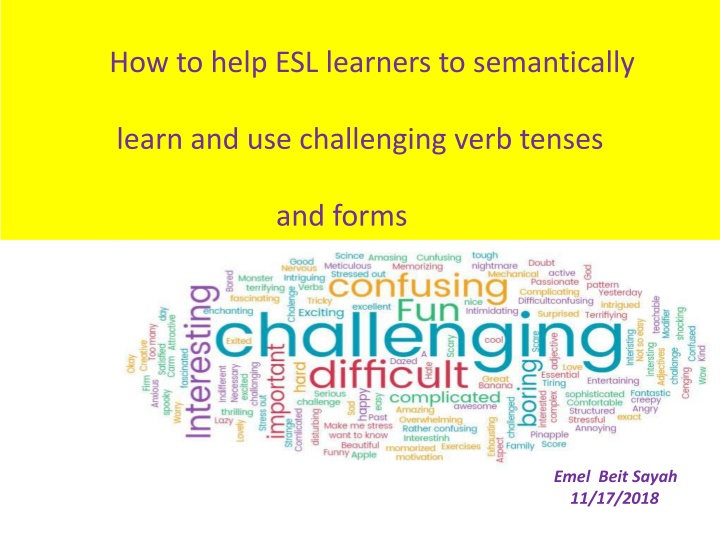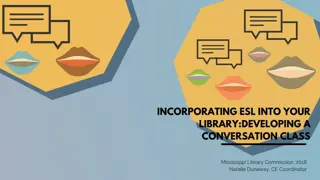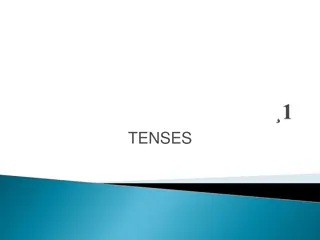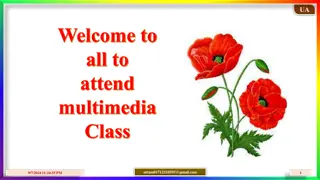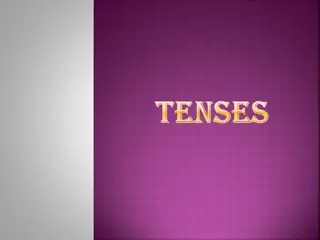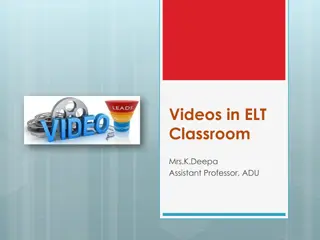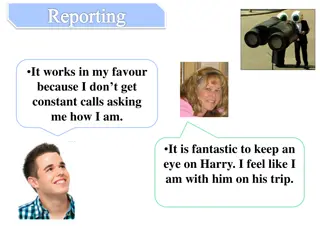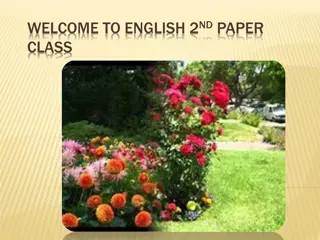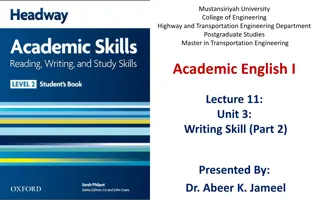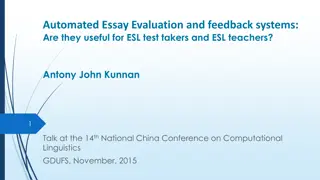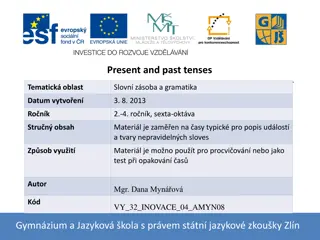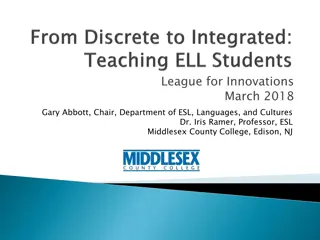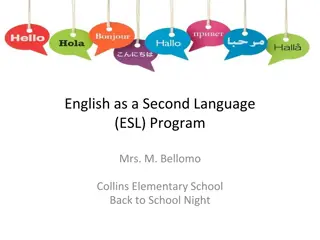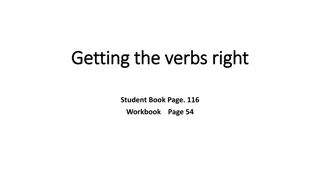Engaging Activities for ESL Learners to Master Challenging Verb Tenses
Enhance ESL learners' understanding and usage of difficult verb tenses through contextualized rules, interactive involvement, and fun communicative games. Explore challenging forms like past perfect vs. simple past and passive voice with practical examples and engaging activities.
Download Presentation

Please find below an Image/Link to download the presentation.
The content on the website is provided AS IS for your information and personal use only. It may not be sold, licensed, or shared on other websites without obtaining consent from the author.If you encounter any issues during the download, it is possible that the publisher has removed the file from their server.
You are allowed to download the files provided on this website for personal or commercial use, subject to the condition that they are used lawfully. All files are the property of their respective owners.
The content on the website is provided AS IS for your information and personal use only. It may not be sold, licensed, or shared on other websites without obtaining consent from the author.
E N D
Presentation Transcript
How to help ESL learners to semantically learn and use challenging verb tenses and forms Emel Beit Sayah 11/17/2018
Tips and Advices 1. Contextualize the rule: a. short stories b. videos c. story dominoes 2. Involve learners by doing something based on the context you created 3. Incorporate fun and communicative games/activities
2 challenging forms for intermediate learners 1. Past perfect vs simple past 2. passive voice 2.a. simple present / simple past 2.b. past perfect / simple past
They hadnt imagined there might be a witness Last week when I left my workplace, I was over the moon. It was Friday and I was thinking about the class of wine that I always have while watching my favourite talk show on Friday nights. HappyFriday I shouted when I got out of my car and headed down toward my house . I was about to step in, when suddenly I heard my neighbour s voice. She was running to me while crying They ve just left . Who? Who has left? I asked terrified. So, she faltered that 3 guys had left my house before I arrived. What? I almost cried and got into the house. The living room looked fine but when I went to the kitchen I saw that they had left the fridge door open and had eaten all the apple pie I had made the day before. The cupboard was open. So, when I checked it out I realized that they had stolen my wine bottle. shoot! Dirty guys! I shouted. But it was not all the story. When I went upstairs I was even more shocked. They had smashed my beloved antique vase that I bought
from Morocco. Then , a couple of DVDs over my bed caught my eyes. I took them to have a closer look. They were labelled confidential. No! They were not mine. I turned my head and noticed that the washroom door was open. I had closed it that morning before I left for work. When I entered the washroom I couldn t believe my eyes. My colleague s body was in the tub with a pale face and open eyes. They had strangled her with my belt. I was about to faint. I couldn t feel my legs. They all had set up everything. Suddenly , the big argument that I had with my colleague in front of everybody s eyes at the company passed sharply through my mind. Then I thought why they had left those DVDs on my bed. I could hear the sound of a siren coming close and closer. That must be the police I thought. Were they going to believe me? Everything was against me. But there s a witness I whispered. Hopefully there s a witness I shouted.
List all the things that the bad guys had done before the narrator of the story came home. They had killed her colleague and had put her body in her house They had left two DVDs on her bed They had smashed her antique vase They had eaten her apple pie They had stolen her wine bottle They had left before she arrived They hadn t thought that there might be a witness.
Practice phase Scenarios Put students into groups of three or four and give each group a situation. They should keep this secret from other groups. 1. Parents arrive home from holiday having left their teenage son in charge of the house. They soon realize he s had a big party while they were away. Start: When they arrived home they saw... 2. A man arrived home having left his new puppy on its own for the first time. Start: When he arrived home he saw... 3. A teacher came back into the class and realized she shouldn t have left the students on their own for that long. Start: She walked back in and saw...
Language focus past present future
Dominoes cards to practice narrative tenses past simple past continuous past perfect past perfect continuous
It was raining outside when Sam got out of bed and looked out of the window. James said he wanted to play football anyway and he didn t care about the rain. While they were playing football, it stopped raining and Sam was really happy he hadn't gone to the cinema. He was walking home, thinking about the goals he had scored that day, when he saw his mum drive past. He picked up his phone and sent a text to his friend James: "No football today. How about going to the cinema?" Sam changed his mind and decided to play too and left the house to join James in the park. After the game Sam went home. On the way he stopped at a shop to buy something for his lunch. She saw him and stopped the car to give him a ride home. She had been working all morning but she was in a good mood. While he was waiting for a reply, Sam brushed his teeth, had a shower and got dressed. While he was walking to the park Sam met two of his other friends and invited them along. He was about to pay when he realized he had forgotten to take his wallet when he had left the house. Sam sat back in his seat and looked forward to having his lunch. He was having a great day.
After he finished getting ready he checked his phone and saw that James had replied. When they all arrived they saw that James had found some other kids to play with and they had enough people for a full match. He apologized and left the shop. Sam was feeling hungry but he knew that he had plenty of food at home. When they arrived Sam cooked lunch for the whole family.
1. It was raining outside when Sam got out of bed and looked out of the window. 2. He picked up his phone and sent a text to his friend James: "No football today. How about going to the cinema? 3. While he was waiting for a reply, Sam brushed his teeth, had a shower and got dressed. 4. After he finished getting ready he checked his phone and saw that James had replied. 5. James said he wanted to play football anyway and he didn t care about the rain. 6. Sam changed his mind and decided to play too and left the house to join James in the park. 7. While he was walking to the park Sam met two of his other friends and invited them along. 8. When they all arrived they saw that James had found some other kids to play with and they had enough people for a full match. 9. While they were playing football, it stopped raining and Sam was really happy he hadn't gone to the cinema.
10. After the game Sam went home. On the way he stopped at a shop to buy something for his lunch. 11. He was about to pay when he realized he had forgotten to take his wallet when he had left the house. 12. He apologized and left the shop. Sam was feeling hungry but he knew that he had plenty of food at home. 13. He was walking home, thinking about the goals he had scored that day, when he saw his mum drive past. 14. She saw him and stopped the car to give him a ride home. She had been working all morning but she was in a good mood. 15. Sam sat back in his seat and looked forward to having his lunch. He was having a great day. 16. When they arrived Sam cooked lunch for the whole family.
Fact or Fiction game There is a list of different situations realistic and one imaginative Students use past perfect to provide two explanations for each situation, one e.g. I walked in to the class, but I didn t recognize anyone a. you had walked into the wrong class (fact) b. you had lost your memory (fiction) Divide the class into pairs and give each pair a copy of the worksheet The class will vote for the most realistic and imaginative explanations.
1. I walked into class, but I didn't recognize anyone. Fact: ...................................................................................................................... Fiction: ................................................................................................................... 2. I took all the money out of my bank account and gave it to charity. Fact: ...................................................................................................................... Fiction: ................................................................................................................... 3. I tried to unlock my front door, but the door wouldn t open. Fact: ...................................................................................................................... Fiction: ................................................................................................................... 4. I walked down the street with a crowd of people following me. Fact: ...................................................................................................................... Fiction: ................................................................................................................... 5. I arrived home completely wet on a sunny day. Fact: ...................................................................................................................... Fiction:
Act out game Student A had entered the class before the teacher(Student B) arrived Student A had eaten the entire meal before student B returned from washroom Student A had already cleaned the board Before student B came to the board Student A had already washed the dishes by the time student B arrived Student A had already walked to the door by the time student B offered a snack Student A had finished the race by the time student B was halfway through
past simple passive vs past perfect passive (discover) (invent) Electricity had been invented before telephone was invented (construct) (discover) (build)
Name Three game for practicing simple present and simple past (passive) 1. Divide into groups of three 2. scuffle the cards, place them down into a pile on the table 3. take turns to pick up a card and make a 'Name three' question by completing the gap with the passive form of the verb in brackets 4. The first student who answer the question successfully will keep the card. 5. The one with the most cards at the end of the game is the winner.
List of great ESL teaching websites: www.bogglesworldesl.com www.Britishcouncil.org/learnenglish www.busyteacher.org www.ESLlibrary.com www.ESLprinter.com www.teach-this.com www.tutela.ca
Thank you very much for your attention and participation
